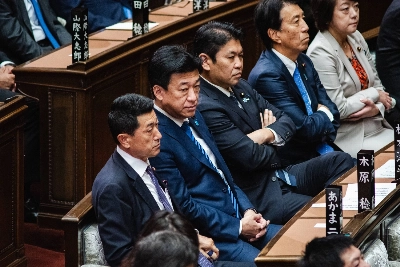Staff writer After five months of preliminary talks, Japan and Mexico will launch full-scale negotiations in mid-March on a pact aimed at protecting and facilitating Japanese investment in the Latin American country. The Japanese negotiating team will visit Mexico for the first round of full-scale negotiations on the investment pact, which, if concluded, will be the first between Japan and a Latin American country, government sources said Thursday. The sources said that Japan wants to reach a final agreement on the investment pact by the end of this year so the agreement can be ratified by the Diet during its next 150- day ordinary session, which is to convene next January. Foreign Minister Yohei Kono and his Mexican counterpart, Rosario Green, will agree at a meeting in Tokyo on Monday that the two countries should conclude the investment negotiations as soon as possible to strengthen bilateral economic relations, the sources said. Green, the first female foreign minister in Mexican history, will make a four-day official visit to Japan starting Saturday. The Japan-Mexico investment agreement, which would enshrine the basic principles of granting "national treatment" and "most-favored-nation" status to Japanese investors in Mexico, could pave the way for a free-trade agreement between the two countries. National treatment means that Mexican and Japanese investors will be treated equally. Most-favored-nation, or MFN, status means that Japanese investors will be treated equally with the U.S. and any other foreign investors. The Japan-Mexico investment pact would also prohibit Mexico from imposing various performance requirements on Japanese investors operating in the country, the sources said. Among the prohibited performance requirements would be a requirement for Japanese investors to export a certain percentage of locally made products to third countries. Mexico is heavily reliant on its giant northern neighbor, the United States, for its economic growth. The U.S. is by far Mexico's largest partner not only in trade but also investment. The economic ties between Mexico and the U.S. have been further strengthened by the North American Free Trade Agreement between the U.S., Canada and Mexico, which went into effect in January 1994. But Mexico, apparently to diversify its trade and investment partners, concluded a free-trade agreement with the 15-nation European Union recently. The Mexico-EU free-trade agreement is expected to take effect this summer. Mexico has wooed Japan as its next target for a free-trade agreement. Japan concluded a friendship and trade treaty with Mexico in 1888, which, among other things, permitted Japan the right to set import tariffs. It was the first treaty Japan had concluded with a foreign country on an equal footing. Mexico has expressed hope that it will become the first country to conclude a free-trade agreement with Japan, according to Japanese officials. In Japan, there is a growing desire among companies, which regard Mexico as an important gateway to the markets of its fellow NAFTA members and other Latin American countries, for a free trade agreement with Mexico as soon as possible. The Japan Federation of Economic Organizations, or Keidanren, as the country's largest business lobby is commonly called, released a report last April calling for an early free-trade agreement between Japan and Mexico. In fiscal 1998, which ended March 31 last year, direct Japanese investment in Mexico totaled 10.6 billion yen, down sharply from 39.3 billion yen in fiscal 1997, according to figures released by the Finance Ministry. As a main pillar of its external trade policy, Japan has long advocated the promotion of a free and multilateral trade system under the General Agreement on Tariffs and Trade and its successor, the World Trade Organization. Japan is the only major industrialized economy that does not have a free trade agreement with any of its economic partners. But in a significant policy change, Japan is now considering bilateral free-trade agreements with some countries. Japan has held full-scale negotiations on an investment liberalization pact with South Korea since last autumn. The possibility of concluding a free-trade agreement between the two Asian neighbors is also being studied at the private-sector level. Last December, Prime Minister Keizo Obuchi and visiting Singaporean Prime Minister Goh Chok Tong agreed to explore the possibility of concluding a free-trade agreement between the two countries. The agreement came only a few weeks after the failure of a WTO ministerial meeting in Seattle to launch a new round of global trade liberalization negotiations. Government officials and private-sector experts from Japan and Singapore will meet in Singapore early next month to discuss the issue for the first time.
14 mins ago


















With your current subscription plan you can comment on stories. However, before writing your first comment, please create a display name in the Profile section of your subscriber account page.